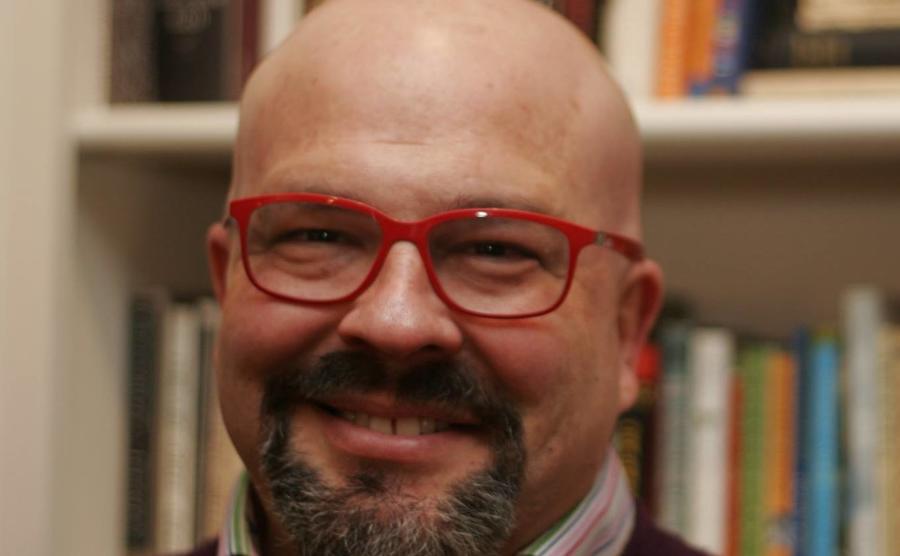Type de contenu
Professeur invitéRicardo Padrón
| Élément joint | Taille |
|---|---|
| Affiche | 3.74 Mo |

Ricardo Padrón is a Professor of Spanish who studies the literature and culture of the early modern Hispanic world, particularly questions of empire, space, and cartography. His recently published monograph, The Indies of the Setting Sun: How Early Modern Spain Mapped the Far East as the Transpacific West (Chicago 2020) examines the place of Pacific and Asia in the Spanish concept of “the Indies.” His research for this book has taken him to China, Japan, and the Philippines, and has been sponsored by U.Va.’s Center for Global Inquiry and Innovation, Arts & Sciences at U.Va., and the National Endowment for the Humanities. He has also published on early modern poetry and historiography, and on the mapping of imaginary worlds in modern times. Prof. Padrón is an active member of the Renaissance Society of America, and is currently serving as a member of its Board of Directors. He is also serving as Director of Graduate Studies in Spanish. During the Spring of 2022, Prof. Padrón will be on research leave, and will be spending part of that time as a visiting professor at the École des Hautes Études en Sciences Sociales in Paris.
Ricardo Padrón participe au Programme Professeurs invités de l’EHESS, sur proposition d'Antonella Romano (EHESS, CAK) et Jean-Marc Besse (EHESS, Géographie-Cités).
CONFÉRENCES
Conférences en anglais.
Race and Geography in the Early Modern World
Dans le séminaire "Nouvelles recherches nord-américanistes. Séminaire du CENA" de Romain Huret, Nicolas Barreyre et Cécile Vidal.
16 mai 2022, 14h-16h, Campus Condorcet, Bâtiment EHESS, salle A427
Recent events have brought race and its history to the forefront of scholarly discourse in many disciplines, particularly in the United States. This course examines the relationship between early racial thinking and global geography, focusing on the tension between climate theory and the architecture of the continents as competing methods for understanding human difference.
Space, Place, and Hispanic Narrative
Dans le séminaire "Savoirs et productions du monde au 16e siècle" de Antonella Romano, Jean-Marc Besse, Rafael Mandressi et Elisa Andretta.
18 mai 2022, 16h30-18h30/ Campus Condorcet, Bâtiment EHESS, salle A527
An ever-growing body of scholarship has brought issues of space and place to the forefront of the study of narrative, both fictional and nonfictional. This class surveys major theoretical analyses of space and place, and asks how they can be used to understand narrative in Spanish from a variety of periods.
Geography Lessons
Conclusion de la journée d’étude "Savoirs dans les mondes ibériques à l’âge moderne, entre histoires impériales et historiographies", organisée par Antonella Romano, en présence de Leo Carrio Cataldi (LMU, Munich), Iris Monteiro (Brown University), José Pardo Tomas (CSIC, Barcelone), Juan Pimentel (CSIC, Madrid), Neil Safier (Brown University).
25 mai 2022, 17h / Campus Condorcet, Bâtiment EHESS, salle A527
Early modern European expansion introduced a wide range of non-European societies to western ways of imagining the world. Sometimes that introduction came in the form of colonialist impositions. Sometimes it came in the form of diplomatic or evangelical dialogue. Invariably, however, non-Europeans responded by assimilating, rejecting, or in some way adapting western cosmovisions and their preferred form of representation – maps, atlases, globes. This course looks at these non-European responses to western “Geography Lessons” in comparative terms.
Hispanic Asianography
Dans le séminaire "Savoirs et productions du monde au 16e siècle" de Antonella Romano, Jean-Marc Besse, Rafael Mandressi et Elisa Andretta.
1er juin 2022, 16h30-18h30 / Campus Condorcet, Bâtiment EHESS, salle A527
Surveys early modern Spanish writing about East and Southeast Asia produced in the context of Spain’s initial conquest of the Philippine Islands and the immediate aftermath. Explores this bibliography in relation to Hispanic Americana, i.e. writing from the same period that deals with the New World.